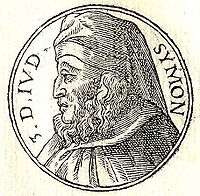Simon Thassi

Simon Maccabeus (also referred to as Simon Thassi, Hebrew: שמעון התרסי; died 135 BCE)[1] was the second son of Mattathias and thus a member of the Hasmonean family. Though the name "Thassi" has an uncertain meaning, "the Director", "the Guide", "the Man of Counsel", and "the Zealous" are all possible meanings of the term.[2]
History
He took a prominent part in the Jewish revolt against the Seleucid Empire led by his brothers, Judas Maccabaeus and Jonathan Maccabaeus. The successes of the Jews rendered it expedient for the pretenders to the throne of Syria to show them special favor, and therefore Antiochus VI. appointed Simon strategus, or military commander, of the coast region from the Ladder of Tyre to Egypt. As strategus Simon conquered the cities of Beth-zur and Joppa, garrisoning them with Jewish troops, and built the fortress of Adida in the plain[3]
After the capture of Jonathan, Simon was elected leader by the people, assembled at Jerusalem; he at once completed the fortification of the capital, and made Joppa secure by expelling its Gentile inhabitants and filling it with Jews (I Macc. xiii. 8, 10, 11; "Ant." xiii. 6, § 4). At Hadid he blocked the advance of the treacherous Trypho, who was attempting to enter the country and seize the throne of Syria. Since Trypho could gain nothing by force, he demanded a ransom for Jonathan and the surrender of Jonathan's sons as hostages. Although Simon was fully aware that Trypho would deceive him, he acceded to both demands, so that the people might see that he had done everything possible for his brother. Jonathan was nevertheless treacherously assassinated, and the hostages were not returned. Simon thus became the sole leader of the people.[3]
As the opponent of Trypho, Simon had every reason to side with Demetrius II., to whom he sent a deputation requesting freedom from taxation for the country. The fact that his request was granted implied the recognition of the political independence of Judea.[3]
He became the first prince of the Hebrew Hasmonean Dynasty. He reigned from 142 to 135 BCE.
The Hasmonean Dynasty was founded by a resolution, adopted in 141 BCE, at a large assembly "of the priests and the people and of the elders of the land, to the effect that Simon should be their leader and high priest forever, until there should arise a faithful prophet" (1 Maccabees 14:41).
Recognition of the new dynasty by the Roman Republic was accorded by the Senate about 139 BCE, when the delegation of Simon was in Rome. Simon made the Jewish people semi-independent of the Seleucid Empire.
In February 135 BCE, he was assassinated at the instigation of his son-in-law and rival Ptolemy, son of Abubus.[1] Simon was followed by his third son, John Hyrcanus, whose two elder brothers, Mattathias and Judah, had been murdered, together with their father.
| Simon Thassi Died: 135 BCE | ||
| Jewish titles | ||
|---|---|---|
| Preceded by Jonathan Maccabeus |
Leader of the Maccabees 142 BCE – 135 BCE |
Succeeded by John Hyrcanus I |
| High Priest of Judaea 142 BCE – 135 BCE | ||
| New title Principality declared |
Prince of Judaea 141 BCE – 135 BCE | |
See also
References
- 1 2 Rogerson, J. W. (2006). The Oxford Handbook of Biblical Studies. OUP Oxford. p. 292. ISBN 9780199254255.
Simon Maccabee was killed by a Jewish rival in 135 bce, the last of the Maccabees to 'die with his boots on', and his son John Hyrcanus (I) took over. Under Hyrcanus (135–104 bce) Jewish independence was finally achieved
- ↑ http://net.bible.org/dictionary.php?word=Thassi
- 1 2 3 "Simon Maccabeus", Jewish Encyclopedia